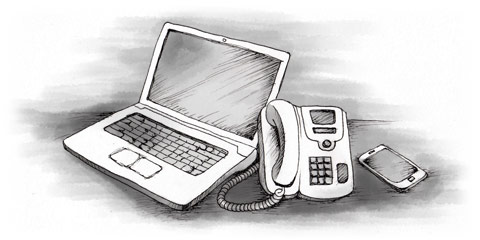Coverage: All providers offer pretty much the same level of coverage. Only if you are going to be living in a remote place or regularly using the mobile while travelling in the countryside, this can make a difference. Ask local people or check with the operators. There you can find more about the coverage in your area (in French: couverture or réseaux) on the operators' websites or on this website .
Phones: The prices of a new phone depend on the retailer and the operator. Each operator sells phones in its own retail outlets, but prices tend to be better in other shops (the large retail chains, such as Carrefour or Auchan often offer good deals). There are also specialist retailers, as well as the chains:
- The Phone House: www.phonehouse.fr
- FNAC: www.fnac.fr (look at: Smartphones, Objets connectés)
- LDLC: www.ldlc.fr
- Darty: www.darty.com
Fees, rates and various services: Unless you have a doctorate in nuclear physics, understanding the pricing plans of the various providers can be a challenge. Each operator offers several different options. Calling plans are complex and built to confuse, making direct comparison practically impossible.
When you consider different options, you should ask yourself:
- How much you think you need to use your mobile: your usage of minutes for calling, text messages and internet data: The costs vary depending on type of contract and operator. If you are not going to use the phone much, but want to be easily contactable, a prepaid card is probably the best solution. If you will be calling a lot, a contract is going to be cheaper if you are going to be in France a year.
- Where you call (fixed lines or which mobile provider): Some operators offer different rates depending whether you call to fixed lines, to mobiles with the same company or to other mobiles. However, today many companies charge the same prices for calling to fixed lines and to other mobile phones.
- If you make many short calls (lasting less than one minute): Some plans bill one full minute on each connection (as a connection fee), while some per second from the beginning of the call.
- If you use your mobile abroad frequently: These rates and services are not available in standard brochures, so if you will be travelling, check out roaming tariffs as there are big differences.
If you are a little bit confused, you can always go to a specialist mobile retailer and ask questions. The staff will be quicker to work out what is best for you - they will obviously be keen to sell as well, so don't be afraid to say you will think about it. There are also some websites on the internet to compare different phone contracts, for example www.edcom.fr .
Prepaid or contract?
Similar to other European countries, you can pay for your calls in two different ways: prepaid or contract.
Prepaid (pré-payés, sans engagement, formules à rechargement): With prepaid phones, you have maximum flexibility since 'you pay as you go', which means you pay in advance for credits which you use afterwards for your calls. You can be called for many months (depending on the provider) without any payment. When you need credit you simply buy recharge cards (cartes pré-payés) that are widely available in newspaper kiosks, tobacco products retailers and online.
The operators tend to make their rates difficult to understand and choosing one is not easy. To choose a prepaid card, take into consideration the points above and the following characteristics:
- Cost of the purchase of SIM card itself (Coût de la cart SIM seule), which sometimes includes a few minutes of communication (crédit d'appels inclus)
- Cost of recharging the card (Coût de recharge)
- Connection fees; some operators do not apply connection fees (Facturation à la seconde dès la première seconde), which is better if you often make many short calls
- Time of the validity to make and to receive calls (these two things are different!) with the recharge purchase (Durée de validité en emission/ réception)
Contract (forfait, abonnements):The other option available is to sign a contract. Besides delaying payment until the end of the month, the benefits of a contract are lower calling rates (quite significantly in some cases) and much better deals on the purchase of new phones (which are sometimes given even for free). When evaluating which plan is best for you, be sure to read all the other conditions.
Besides the general points above, there are some things you should aditionally consider when choosing a contract:
- Monthly fees (coût mensuel)
- Minimum length of contract (Durée de l'abonnement, Durée minimum d'engagement) - usually 12 - 24 months, the penalties on finishing a contract early mean you are probably paying for the duration in most cases
- Cost per minute (Prix de revient à la minute) within the plan (dans le forfait) and when you exceed the plan (hors forfeit)
- Services included (e.g. answering system, photo messaging, GPRS, internet data)
- Whether or not unused minutes within your plan can carried over to the following period(s) (Report des minutes inutilisées)
Contracts are fairly easy to obtain on an individual basis. There are no credit checks nor do you need to provide proof of income. All mobile companies require direct debits (prélevement automatique) from your bank account. Many new arrivals start with a prepaid phone and then convert to a contract when they have sorted out the paperwork

